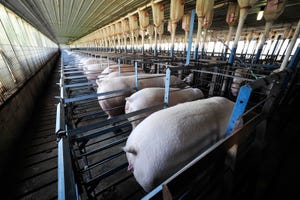March 15, 2013

Rep. Louise Slaughter (D-NY), the only microbiologist in Congress, introduced the Preservation of Antibiotics for Medical Treatment Act, or PAMTA, yesterday for the fourth time since 2007. The bill would ban non-therapeutic uses of medically important antibiotics in food animal production.
Food Safety News reports that the announcement comes just two weeks after the Centers for Disease Control and Prevention issued a dire warning about antibiotic resistance infections, and points out that while animal agriculture uses the majority of antibiotics sold in the United States, exactly what role the sector plays in the development of increasingly prevalent superbugs is still up for debate.
See related story: Antibiotic Resistant Bacteria in Food Nearing a Public Health Catastrophe.
According to a news release from Slaughter, the latest version of the bill has two updates. The legislation now covers cephalosporins, bringing the total to eight classes of medically important antibiotics that would be banned from so called non-therapeutic uses. The measure also clarifies what is considered non-therapeutic “to ensure that any use of medically important antibiotics outside of treatment of a sick animal is not permitted,” according to Slaughter’s office.
Slaughter says she added cephalosporins in response to the most recent NARMS Retail Meat Survey data, which showed that over the past decade there has been a significant increase in cephalosporin resistance, especially on chicken and turkey products.
Like what you're reading? Subscribe to the National Hog Farmer Weekly Wrap Up newsletter and get the latest news delivered right to your inbox every Friday!
Food Safety News says Rep. Slaughter has been loud and clear with her criticism of FDA’s new approach to reducing non-therapeutic, or non-judicious antibiotic use in food animal production. The agency announced last year it will publish a rule asking drug makers to voluntarily remove their growth promotion uses from their labels and to bring the drugs under veterinary supervision. If the approach doesn’t yield results, the agency may consider other regulatory options in a few years.
“We’re going to pass this bill,” Slaughter told Food Safety News. “We have to do it and we’re trying our best to get the FDA to wake up. They need to end their listening sessions – they’ve been listening for long enough. We know for a fact that the industry won’t voluntarily give these up – we know from years of trying that that’s not going to work.”
See related story: Antibiotic Use Statistics Prove Misleading.
PAMTA is endorsed by nearly 450 organizations, according to Slaughter. It remains unclear how much support Slaughter will be able to obtain in order to move the legislation forward. Food Safety News reports that Slaughter’s office has just begun the process of re-enlisting old cosponsors and asking for new support for the bill. In 2011, the bill had 92 cosponsors in the House and a companion bill had seven cosponsors in the Senate. The legislation faces fierce opposition from livestock groups, the veterinary drug industry and agricultural interests in many states and congressional districts.
Read the entire article in Food Safety News here. Visit Slaughter’s Web site for additional details.
You might also like:
Antibiotic Sales Doesn’t Make the Case for Public Health Threat
EPA Chief Sends Regrets, Yet Releases Sensitive Farm Data Anyway
You May Also Like



